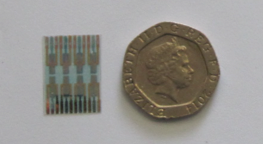Case Study – Gas Sensors for Fruit Storage
Improved storage of apples is achieved by blocking their response to ethylene – the natural hormone released during the ripening process. The apples are treated with a synthetic hormone called 1-methylcyclopropene (1-MCP), which is structurally similar to the natural ethylene hormone and competitively binds to the receptors, but does not trigger the ripening process as ethylene does. This treatment is routinely carried out in commercial apple stores, but without a real time, cost effective method to measure the concentration of the gaseous 1-MCP during the treatment stage.
Using organic thin film transistors (OTFTs), CDT developed a gas sensor that can differentiate between the natural ethylene hormone and the synthetic 1-MCP hormone. A coated semiconductor at the top of device interacts with gases in the environment. The OTFTs can be printed on lightweight, flexible substrates.
Fruit suppliers now have an effective technology to ensure a suitable treatment of apples, resulting in reduced economic losses during fruit storage.



